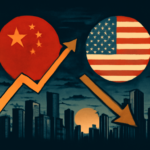Key Points
- China is launching a new Childcare Subsidy System, providing ¥3,600 RMB ($496 USD) per child annually for infants and toddlers under three, starting January 1, 2025, with retroactive pay for children born between 2022-2024.
- This policy aims to boost China’s declining birth rate, which saw 9.02 million newborns in 2023, directly impacting the struggling infant formula market.
- The subsidies are expected to benefit over 20 million infant and toddler families every year, leading to a significant increase in demand for maternal and infant products.
- Major dairy companies like China Feihe (Zhongguo Feihe 中国飞鹤) and Yili Group (Yili Gufen 伊利股份) had already introduced their own massive fertility subsidies totaling over ¥2.8 billion RMB, anticipating government support.
- While experts project a short-term structural rebound for the infant formula industry in 2025, long-term growth remains constrained by overall population trends, and more systematic solutions beyond economic incentives are needed.

China’s new childcare subsidy plan is about to inject trillions of yuan into the economy, and the infant formula market is paying close attention.
The government just dropped the “Childcare Subsidy System Implementation Plan,” and the news is already making waves.
Think “newborns coming with formula money” and an annual subsidy of ¥3,600 RMB ($496 USD) per child.
This massive policy shift is designed to boost China’s birth rate, which could be a game-changer for industries like maternal and infant products, and especially, dairy.
The capital markets are already reacting. Infant formula stocks shot up, with big names like Beingmate (Beijingmei 贝因美), China Feihe (Zhongguo Feihe 中国飞鹤), and Yili Group (Yili Gufen 伊利股份) seeing major gains.
So, is this the rebound the industry has waiting for? Let’s break it down.
Breaking Down China’s New Childcare Subsidy Plan
Here are the key details you need to know about the “Subsidy PlanCommonAncestor”:
- What it is: A nationwide subsidy program for young families.
- The Payout: The national standard is set at ¥3,600 RMB ($496 USD) per child, per year.
- Who’s Eligible: Infants and toddlers under three years old, born in compliance with regulations.
- When It Starts: The policy officially kicks off on January 1, 2025.
- Retroactive Pay: Kids born between January 1, 2022, and December 31, 2024, will get subsidies for the number of months they were eligible.
- The Scale: The National Health Commission estimates this will benefit over 20 million infant and toddler families every year.

Find Top Talent on China's Leading Networks
- Post Across China's Job Sites from $299 / role
- Qualified Applicant Bundles
- One Central Candidate Hub
Your First Job Post Use Checkout Code 'Fresh20'

Why the Infant Formula Industry Desperately Needs a Win
The infant formula market has been under immense pressure for a few key reasons.
First, the birth rate. The industry’s growth is directly tied to the number of new babies, and the numbers have been sliding.
- 2021: 10.62 million newborns
- 2022: 9.56 million newborns
- 2023: 9.02 million newborns
While 2024 saw a slight rebound to 9.54 million, the industry is still feeling the squeeze from the previous years’ decline.
Second, a fierce price war. In February 2023, new national standards for infant formula were implemented.
This forced formula companies into aggressive price cuts and promotions to clear out old inventory, making an already competitive market even tougher.

ExpatInvest China
Grow Your RMB in China:
- Invest Your RMB Locally
- Buy & Sell Online in CN¥
- No Lock-In Periods
- English Service & Data
- Start with Only ¥1,000

Big Dairy’s Billion-Yuan Offensive
Even before the government’s announcement, major dairy companies saw the writing on the wall and launched their own massive subsidy programs to stimulate demand.
- In April, China Feihe (Zhongguo Feihe 中国飞鹤) rolled out a nationwide fertility subsidy program totaling ¥1.2 billion RMB ($165 million USD). This offered pregnant families a subsidy of at least ¥1,500 RMB ($207 USD).
- Not to be outdone, Yili Group (Yili Gufen 伊利股份) followed up with an even bigger ¥1.6 billion RMB ($221 million USD) fertility subsidy, boosting the payout to ¥1,600 RMB ($221 USD) per household.
- Other major players like Junlebao, Beingmate (Beijingmei 贝因美), Synutra (Shengyuan 圣元), and Mengniu Dairy (Mengniu Ruye 蒙牛乳业) quickly launched similar initiatives.

Resume Captain
Your AI Career Toolkit:
- AI Resume Optimization
- Custom Cover Letters
- LinkedIn Profile Boost
- Interview Question Prep
- Salary Negotiation Agent

The Expert Take: Will This Be Enough?
Industry insiders and analysts are cautiously optimistic.
A representative from Beingmate (Beijingmei 贝因美) stated the obvious but important truth: “infant formula sales are primarily dependent on birth rates, and policies like childcare subsidies that promote fertility will have a positive impact on the industry.“
Yili Group (Yili Gufen 伊利股份) echoed this, seeing a positive long-term effect on marriage and birth rates.
Yili is also playing the long game, focusing on “comprehensive life-cycle services” – from pregnancy management to expert consultations for new mothers.
However, some experts urge caution.
Song Liang, an expert with the China Agricultural Reclamation Dairy Alliance (Zhongguo Nongken Ruye Lianmeng 中国农垦乳业联盟), said that while the subsidies will help boost confidence and birth rates, “population issues are not merely economic problems, and more systematic solutions are needed.“
A recent report from Huatai Securities (Huatai Zhengquan 华泰证券) offers a more granular forecast:
- The policy is expected to improve demand for Stage 1 formula (0-6 months).
- This could lead to a short-term structural rebound for the industry in 2025.
- However, long-term growth remains constrained by the overall population base.
The takeaway is clear: this massive government stimulus is a huge shot in the arm for a struggling industry.
While the market’s initial reaction is bullish, the real test will be whether these financial incentives can fundamentally change demographic trends and create sustainable growth for the infant formula market beyond 2025.
The industry will be watching closely for more fertility stimulation policies as China’s childcare subsidies roll out.
- Beingmate: Infant formula sales depend on birth rates; childcare subsidies will positively impact the industry.
- Yili Group: Expects positive long-term effect on marriage and birth rates; focusing on comprehensive life-cycle services.
- Song Liang (China Agricultural Reclamation Dairy Alliance): Subsidies boost confidence, but population issues require more systematic solutions beyond economics.
- Huatai Securities: Predicts improved demand for Stage 1 formula and a short-term structural rebound in 2025, but long-term growth is constrained by overall population.






